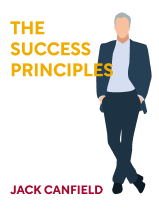

This article is an excerpt from the Shortform book guide to "The Success Principles" by Jack Canfield. Shortform has the world's best summaries and analyses of books you should be reading.
Like this article? Sign up for a free trial here .
Do you find that money is hard to come by? Do you try to hold on to every dollar and almost never splurge to treat yourself? Where do you think these limiting money beliefs come from?
Making enough money to enjoy the lifestyle you want can help you feel successful. But it’s easy to let limiting money beliefs and unhelpful behavior gets in the way.
In this article, you’ll learn how to change your thinking to better position yourself for financial success.
Let Go of Limiting Money Beliefs
You likely developed your ideas about money during childhood. Phrases you heard and experiences you had can color how you think about money as an adult, causing you to hold back from taking steps to attain your preferred level of wealth. Some common phrases you may have heard include:
- Nothing is free.
- Money doesn’t grow on trees.
- Money doesn’t buy happiness.
- More money, more problems.
- Rich people are evil, greedy, unethical, and so on.
Many have grown up with the idea that rich people are rich because they exploited poor people. While that may be true to some extent, this is just not how money works.
Take Action: Counteract Limiting Money Beliefs
Try the following activity to address your limiting beliefs about money:
- Write down the belief.
- Question the belief. One way to do this is writing an alternative list of beliefs that make fun of the limiting belief or offer a new one. For example, if your belief is that money is the root of all evil, your alternative list might be, “money is the root of delicious brunches.” If you feel inspired, write some of your alternative beliefs down on index cards and read them along with your affirmations each day.
- Rewrite the statement so that it’s the opposite of the original belief. In the example about money being the root of evil, you might write, “Money I receive is a product of my passion and efforts to help others.”
Once you’ve started reforming your ideas about money, continue to cultivate positive thinking about it with the following three techniques:
- Use affirmations. Affirmations bombard your mind with positive feelings about what you hope to achieve. (For a refresher on affirmations, read Principles 4-6: Believe in Yourself and Your Dreams.)
- Visualize. Visualize yourself getting the money you want, and all of the things you’ll do with it, like enjoying a fancy vacation. (For a refresher on visualization, see Principles 7, 8, 11, 23: Set Goals).
- Create an “Is” box. Similar to visualization, you can use an Is Box to store your visions for the future. Create a label that says “What’s in this box…IS!” or something to that effect. Clip images or make art of what you’d like to achieve with the money you’ll earn. Regularly visit the images in the box and imagine what it’ll be like to have what you want and enjoy it. This will encourage you to make these things a reality.
As you attempt to change your money mindset, you may find yourself thinking contrary thoughts. When this happens, write down the thought and the negative emotions it brings up for you. Then, work to release the thought using tapping therapy (see Principle 29: Resolve Past Hurts) or using Sedona Therapy.

———End of Preview———
Like what you just read? Read the rest of the world's best book summary and analysis of Jack Canfield's "The Success Principles" at Shortform .
Here's what you'll find in our full The Success Principles summary :
- The 67 principles to help anyone achieve their goals and dreams
- Why achieving your goals requires you to invest your time and effort
- How to take responsibility for your own life






